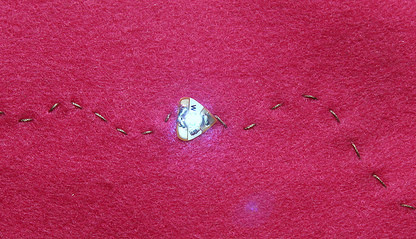Circuit Stickers
November 22, 2013
on
on

Circuit stickers are electronic modules with conductive adhesive to add electronics to any sticker-friendly surface. In combination with conductive materials used for 'wiring' such as conductive paint or thread, people can add their own electronic creations to clothing, paper and plastic.
The stick-on electronics come in kits with different kinds of components: LEDs, sound and light sensors and effect modules that make LEDs twinkle or fade. There are also a programmable ATTiny85 microcontroller stickers.
Circuit Stickers are the creation of Jie Qi and bunnie, who collaborate under the name Chibitronics. Qi is a PhD student at the MIT Media Lab where she researches the interface between traditional arts & crafts and electronics & programming. Bunnie is a hardware hacker and Director of Studio Kosagi.
On his blog bunnie lays out the technical details of sticky electronics:
Chibitronics is running a crowdfunding campaign on Crowd Supply, a product development platform. With forty days left they've funded 1,108,200% of their goal. That is to say, they've raised $11,082 in pledges on a $1 goal. Chibitronics isn't really looking for funding, the Circuit Stickers are part of an academic research project and they've already been produced in small volumes. Part of the research is studying scalability in industrial processes and Chibitronics can meet virtually any demand. The campaign serves to make the sticker kits available to people who'd like to have them.
The creators write: 'Our ultimate goal is see if Circuit Stickers can inspire more people to start expressing themselves through making electronics, to see what cool projects you all come up with, and ultimately expand how we all think about technology!'
The stick-on electronics come in kits with different kinds of components: LEDs, sound and light sensors and effect modules that make LEDs twinkle or fade. There are also a programmable ATTiny85 microcontroller stickers.
Circuit Stickers are the creation of Jie Qi and bunnie, who collaborate under the name Chibitronics. Qi is a PhD student at the MIT Media Lab where she researches the interface between traditional arts & crafts and electronics & programming. Bunnie is a hardware hacker and Director of Studio Kosagi.
On his blog bunnie lays out the technical details of sticky electronics:
They are circuits on a flexible polyimide substrate with anisotropic tape (or “Z-tape” — so named because electricity only flows vertically through the tape, and not laterally) laminated on the back.
The use of Z-tape allows one to assemble circuits without the need for high-temperature processing (e.g. soldering or reflow), thereby enabling compatibility with heat-sensitive and/or pliable material substrates, such as paper, fabric, plastic, and so forth.
Chibitronics is running a crowdfunding campaign on Crowd Supply, a product development platform. With forty days left they've funded 1,108,200% of their goal. That is to say, they've raised $11,082 in pledges on a $1 goal. Chibitronics isn't really looking for funding, the Circuit Stickers are part of an academic research project and they've already been produced in small volumes. Part of the research is studying scalability in industrial processes and Chibitronics can meet virtually any demand. The campaign serves to make the sticker kits available to people who'd like to have them.
The creators write: 'Our ultimate goal is see if Circuit Stickers can inspire more people to start expressing themselves through making electronics, to see what cool projects you all come up with, and ultimately expand how we all think about technology!'
Read full article
Hide full article


Discussion (1 comment)